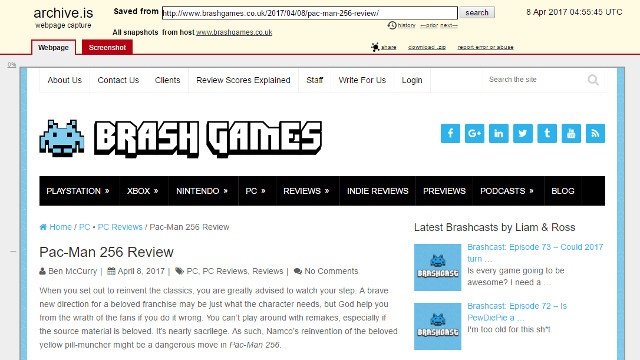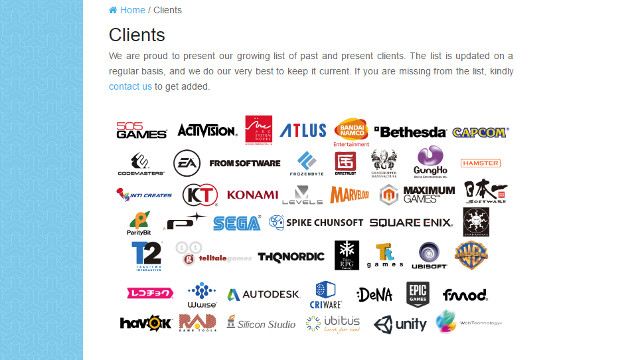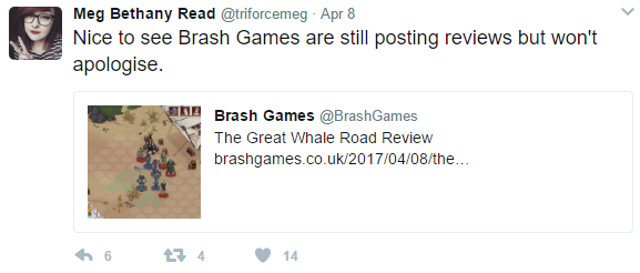[Editor's Note: While GameRevolution normally refrains from writing about other sites, we have made an exception in this case due to the involvement of alleged unethical behavior and mistreatment of authors in the gaming industry. We are in no way attempting to discourage anyone from visiting Brash Games, and instead would like to have an open discussion about what has transpired.]
During the past three years Brash Games has published more than 1,100 video game reviews. Many of these can be found on aggregate websites Metacritic and GameRankings where it has influenced average ratings for some of the industry's biggest titles.
Despite this presence, Brash Games isn't a particularly well-known site. As with many newer gaming sites, it battles for organic traffic among a sea of competitors. But that hasn't stopped the site from accumulating a large staff. In-fact, prior to this week it listed more than two dozen authors on its staff page. A few of these writers are friends of site owner Paul Ryan, while the overwhelming majority are unpaid volunteers who want nothing more than experience and to get their name out.
In this sense, Brash Games offers an opportunity for many aspiring games writers. With a relatively attractive website design, authority on the biggest game review aggregate sites in the world, and review codes pouring in like rain, it appears to be the perfect place to get started in the business of writing about games. Not so fast.

Brash Games was recently thrust into the spotlight after allegations that its owner has removed author attribution when staff members leave the site. Several of its writers have spoken out about the issue during the past few weeks, but it wasn't until contributor Ben McCurry published his review of Pac-Man 256 that the issue gained mainstream visibility.
In the review, McCurry interjected thorough descriptions of the work climate at Brash Games, stating "this very website that stripes authors of their writing credits when they leave the site, later attributing them to the sole owner and editor, Paul Ryan". The publication of the review triggered widespread attention, and even a number of other authors chiming in with their similarly unpleasant experiences.
Brash Games refuted the allegations, stating that when "an account is revoked or marked as inactive it seems to delete the account and assign content to the default account". Given that an incredible majority of video game sites similarly use WordPress and don't suffer from a similar issue, it's difficult to believe, but is worth taking into consideration.
These events sound like something straight out of a novel with Orwellian-like qualities. Though, it's only the tip of the iceberg.
OpenCritic has been investigating Brash Games for several weeks following a peculiar interaction in March. At the time of the publishing of this article, it has released a PDF report describing its communications with site owner Paul Ryan, in addition to its findings when speaking with several former authors of his site.
The report begins by stating, "On March 31st, the OpenCritic team received evidence that Brash Games, then an official publication on OpenCritic, had changed the review score of a review written by Josh Robertson despite his clear objection".
 Brash calls publishers who send review codes "clients", and plagiarized Nintendo's publisher support image.
Brash calls publishers who send review codes "clients", and plagiarized Nintendo's publisher support image.The investigation began shortly after OpenCritic noticed that one of Brash Games' reviews written by Josh Robertson had been edited post-publish. Although the review was originally listed as a 3/10, which would find its way to all aggregate websites including Metacritic, GameRankings, and OpenCritic, it would soon after be updated to 5/10 with no explanation.
It isn't terribly uncommon for there to be some level of dialog between the time a writer finishes writing a review and when it's published. However, usually these discussions are regarding the thoroughness of a review, small adjustments that need to be made, or ensuring that the text matches the score. Completely changing a review score is a big no-no as it effectively establishes that the editor who didn't play the game has an opinion more meaningful than the author who did play the game.
However, as reported by more than a dozen former authors who have written for the site, review score edits happen quite frequently at Brash Games. Part of the reason for this could be explained by the site's lack of a review edit process, which allows authors to live publish even in cases where the review might be deemed unsatisfactory by Paul Ryan. Though, it could also be explained as misuse of power.
As McCurry would describe, "I thought this game was great, but I’m going to – on behalf of Brash Games – award it a 1 out of 10. I do this safe in the knowledge that the editor will change it later without me knowing to fit the score HE would prefer. This is not an exaggeration: review scores selected by authors were changed by the editor without warning, explanation, or consideration, and several alumni of Brash Games corroborate this. As such, I would not want to begrudge my former editor another opportunity to do this."

Things don't end there. Following the lash back that Paul Ryan received, Brash Games' staff page no longer includes any reference to author names. Previously, it not only noted their name, but listed them in descending order based on how many article they have published, with links to pages dedicated to their written work. In addition, the official @BrashGames Twitter account has unfollowed more than 100,000 people almost instantaneously, leaving only four at the time of the publishing of this article.
In addition, OpenCritic states that it "found traces of attempted cover-ups including efforts such as editing or deleting old reviews, sending dubious legal documents and threats, blocking OpenCritic team member IP addresses", among other shady behavior.
At this point you might be hoping to see the Pac-Man 256 review. The problem is, it's been deleted from the site—understandably. Also, Wayback Machine support for Brash Games has been disabled from the site owner. Thankfully, Archive.is is here to the rescue.
Incidentally Paul Ryan personally requested that Brash Games be removed from aggregates. As described in McCurry's Pac-Man 256 review, "Brash Games deliberately ghosted themselves from Metacritic, GameRankings, and OpenCritic." In the case of OpenCritic, this has been confirmed by its owner.
OpenCritic concluded its findings with the following statement:
In response, going forward OpenCritic will have a stricter approval process and hopes that such incidents will be reported by individuals affected.
You can view the full report here.






